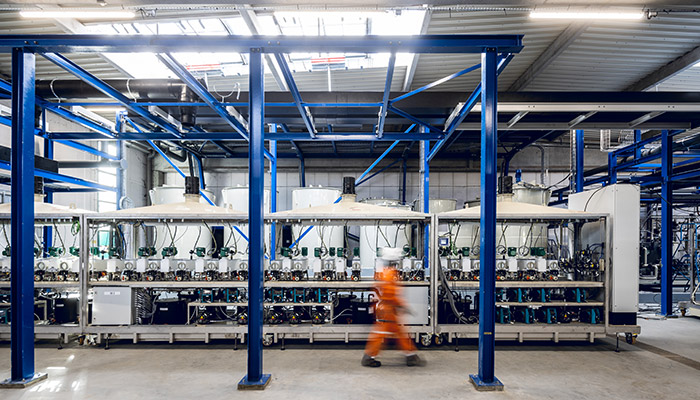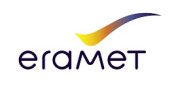Eramet is inaugurating a pilot plant at its Research & Innovation center close to Paris (Trappes) to test and optimize the production of battery-grade metal salts from black mass from recycled lithium-ion batteries.
This facility is a 1:1,000 scale replica of the plant due to be built in Dunkirk (59), with start-up scheduled for 2027, subject to a final investment decision expected by the end of 2024.
The creation of this pilot plant is a key stage for this project carried out in partnership with SUEZ and aiming to offer a closed-loop industrial recycling solution for end-of-life batteries and scrap from the production of new batteries.
Thanks to its expertise in hydrometallurgy, Eramet’s Research & Innovation Centre, which employs 200 researchers and engineers, has developed a process that can infinitely recycle more than 90% of the strategic metals (nickel, cobalt, lithium) contained in the blackmass of end-of-life batteries and in scrap from gigafactory production.
The high-purity metal salts obtained by this process and produced in Dunkirk will be used to supply the European electric battery industry, helping to reduce the continent’s dependence on the import of critical metals.
The 800 m² pilot plant will be used to test and optimise the extraction and refining process for these metals on a pre-industrial scale, and to qualify the end products for future customers and partners.
This project has received €80 million in financial support from the European Union’s Innovation Fund and BPI, through its “Critical Metals Call for Projects”. These funds will be used to finance pre-industrialisation studies, plant construction and operating costs for the first 10 years of operation.
Two internationally renowned players at the service of the French recycling sector
This official opening is an important milestone in the execution of the project carried out in partnership with SUEZ. The plan is to build two plants in Dunkirk:
- an “upstream” plant managed by SUEZ to dismantle, crush and separate the various components of the batteries to produce blackmass, a black powder containing the strategic metals nickel, cobalt and lithium. The plant will eventually have a capacity of 50,000 tonnes of battery modules per year, equivalent to 200,000 electric vehicle batteries.
- a “downstream” hydrometallurgy plant managed by Eramet, responsible for extracting and refining the strategic metals contained in the blackmass to produce 5,000 tonnes of nickel, 1,000 tonnes of cobalt and 5,000 tonnes of lithium a year in the form of battery-grade metal salts using the process tested at the Trappes pilot plant.
The final investment decision for the project is expected to be made by the end of 2023 for the upstream plant, for a start-up of the site in 2025, and by the end of 2024 for the downstream plant, for a start-up in 2027. The project as a whole will thus provide a comprehensive industrial response in line with the regulatory requirements set by the European Commission in terms of recycling efficiency and recovery of strategic metals.
It aligns with Eramet and SUEZ’s shared ambition to promote ecological transition and a circular economy.
Eramet, a key player in the lithium value chain
With the creation of this pilot plant, Eramet is firmly establishing itself as a key player in the lithium value chain.
As a technology leader in the recycling of lithium-ion battery black mass, Eramet will soon become Europe’s leading producer of lithium carbonate by volume, with the Centenario (Argentina) site scheduled to come on stream in the second quarter of 2024, with production capacity set to reach 24,000 tonnes a year by mid-2025. The Group will deploy its direct extraction technology, which is among the most efficient in the world (lithium extraction rate in brines of around 90%) – another technology developed and patented by Eramet Research and Innovation Centre.
The Group is also working in cooperation with Electricité de Strasbourg on the AGELI project, which aims to produce 10,000 tons of lithium carbonate per year from geothermal sources located in Alsace (Northeastern France). Production could start up by the end of the decade, subject to the results of ongoing studies and an investment decision.
Speaking at the inauguration, Christel Bories, Chairman and CEO of Eramet, said: “After developing one of the most efficient direct lithium extraction technologies in the world, our Research and Innovation Centre is once again demonstrating its excellence and expertise in the hydrometallurgy of critical metals. This technological advance positions us, with our partner SUEZ, as tomorrow’s leaders in the recovery of “urban mines”, the millions of electric batteries that need to be recycled and recovered in Europe.”
Agnès Pannier-Runacher, Minister for Energy Transition, said: “This Eramet – SUEZ project, winner of France 2030, is an important and exemplary project. This is important in order not to switch from one dependency to another, as critical metals are now at the heart of all strategic value chains in the zero-carbon economy. It is exemplary because it embodies the absolute necessity of including sobriety in all our public policies. This project, which will allow us to recycle the electric batteries of our cars, the demand for which will be multiplied by at least ten by 2030, is also about sobriety in the use of metals by reducing the consumption of our planet’s primary resources by offering low-carbon recycled metals.”
ABOUT ERAMET
Eramet transforms the Earth’s mineral resources to provide sustainable and responsible solutions to the growth of the industry and to the challenges of the energy transition.
Its employees are committed to this through their civic and contributory approach in all the countries where the mining and metallurgical group is present.
Manganese, nickel, mineral sands, lithium, and cobalt: Eramet recovers and develops metals that are essential to the construction of a more sustainable world.
As a privileged partner of its industrial clients, the Group contributes to making robust and resistant infrastructures and constructions, more efficient means of mobility, safer health tools and more efficient telecommunications devices.
Fully committed to the era of metals, Eramet’s ambition is to become a reference for the responsible transformation of the Earth’s mineral resources for living well together.
www.eramet.com







Be the first to comment on "Eramet inaugurates a pilot plant for the recycling of electric vehicle batteries"